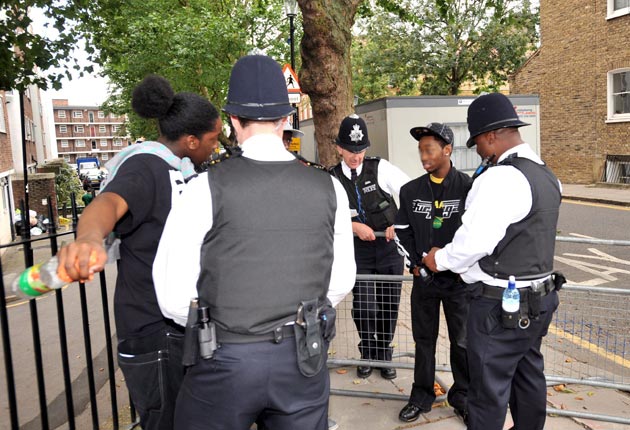Black and Asian youths still victims of rough justice
Rights commission warns senior police officers they must bring about change

Your support helps us to tell the story
From reproductive rights to climate change to Big Tech, The Independent is on the ground when the story is developing. Whether it's investigating the financials of Elon Musk's pro-Trump PAC or producing our latest documentary, 'The A Word', which shines a light on the American women fighting for reproductive rights, we know how important it is to parse out the facts from the messaging.
At such a critical moment in US history, we need reporters on the ground. Your donation allows us to keep sending journalists to speak to both sides of the story.
The Independent is trusted by Americans across the entire political spectrum. And unlike many other quality news outlets, we choose not to lock Americans out of our reporting and analysis with paywalls. We believe quality journalism should be available to everyone, paid for by those who can afford it.
Your support makes all the difference.Black teenagers accused of crime in Britain face discrimination in the criminal justice system, an investigation has found.
In one of the most comprehensive studies of youth justice in recent years, the Equality and Human Rights Commission (EHRC) says that black and mixed-race youths are three times more likely to be denied bail than their white counterparts. The report says: "Differences in the treatment between black and mixed-race youths and white youths could not be accounted for by the severity of the crimes or defendants' criminal history, indicating that discrimination may be taking place."
The researchers also found that the disproportionate use of controversial "stop and search" powers by police still gives grounds for allegations of racism in the treatment of ethnic minorities within the youth justice system.
"Adversarial police tactics are damaging community relations, which can only be counterproductive to reducing youth crime," the report said.
Once facing court, black defendants were 3.3 times more likely and mixed race defendants 2.6 times more likely than white youths to be remanded in custody before their hearing date. This was found to have a significant impact on whether a young person subsequently received a custodial sentence imposed by the judge or magistrates, if the case proceeded.
But the report also found that when the case reached court, black youths were one and a half times more likely to have their cases dismissed or withdrawn, compared to white defendants.
Recommendations by the EHRC highlight that strong leadership by senior police officers is required if a "rule of law" approach to policing is to be widely adopted by all police officers.
In a separate report published today, the ECHR calls for a review of the use stop and search powers across the UK. The study concludes: "The evidence suggests that some forces are exercising their powers not on the basis of intelligence or reasonable suspicion but on stereotypical assumptions, which is not helping to make society safer."
Most constabularies in England and Wales were found to be continuing to use the powers "disproportionately" against ethnic minorities.
Commission chiefs have written to forces warning that they could potentially be sued over possible breaches of the Race Relations Act. The research showed that black people are at least six times as likely to be stopped as white people. For Asian people, being stopped is around twice as likely.
"Such an approach to policing erodes trust and makes co-operation harder, not just between police forces and the groups who are singled out, but also among the wider public, who are ill at ease with the idea of the state intruding unnecessarily into individuals' private lives and their freedom to go about their business," say the report's authors.
The report also warns that "the current police use of stop and search powers may be unlawful, disproportionate, discriminatory and damaging to relations within and between communities." It concludes: "We will consider taking enforcement action if we believe police forces are not sufficiently addressing this problem."
Join our commenting forum
Join thought-provoking conversations, follow other Independent readers and see their replies
Comments